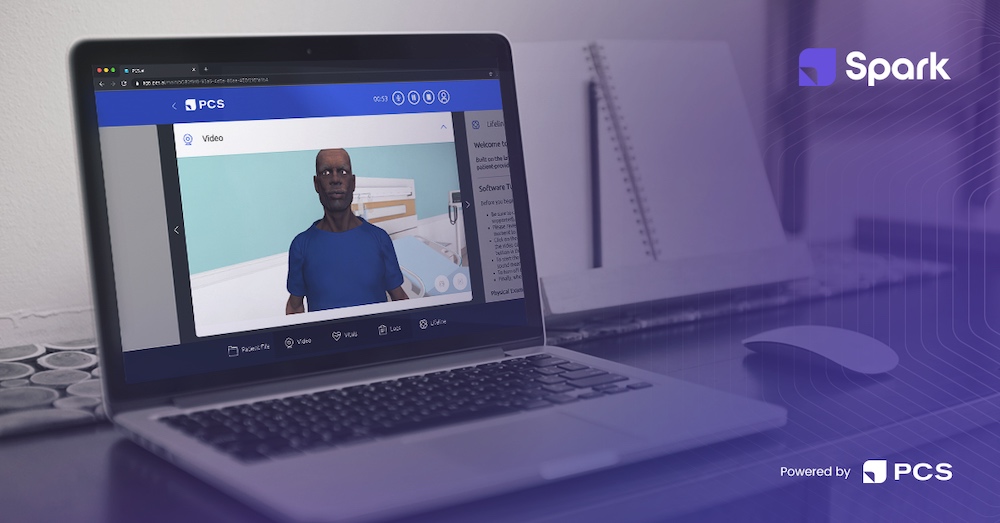Twenty years after Kubrick’s imagined 2001: A Space Odyssey and Artificial Intelligence (AI) conversation has finally arrived in healthcare simulation. Patient Communication Simulators, more commonly known as PCS, is changing the game of clinical interview training within healthcare simulation. The company’s innovative PCS Spark cloud-based learning platform utilizes real-time AI to power verbal responses from virtual patients. In other words, Science Fiction “Sci-Fi” has become “Hi-Fi” High-Fidelity simulation learning! Here we take a closer look at Spark from PCS and explain why the future of simulated clinical communication is already here.
“There are very few technologies within clinical simulation that make our jaw drop, but the communication AI in PCS Spark is absolutely on the list,” shared HealthySimulation.com Founder Lance Baily.
PCS Spark is a cloud-based speech-recognition-powered artificially intelligent patient communication simulator. Built on the latest machine learning technologies, the PCS Engine delivers conversational AI for patient-provider interview training, which can be screen-based or displayed in Virtual Reality (VR). This means authentic natural conversations, not just simply drop-down menus with pre-written answers. PCS Spark patients can be any age, gender or ethnicity, who can present a diverse range of pathologies and associated symptoms, something not quickly duplicated with physical manikins in fixed sim labs or standardized patient programs.
The platform enables clinical learners to develop patient communication skills and empathy, experience a diverse range of simulated patients safely, engage with content remotely, and work in groups for clinical interviews which can be easily customized by clinical faculty. Best of all, PCS Spark provides instant and automated assessment at the end of each scenario letting learners know which areas they did well in and which need further work.
The most exciting realization when using a platform based on machine learning is that the system gets smarter after every interaction. What this means is that each and every day PCS Spark patients get a little smarter and therefore better at responding to clinical interviews. With each new institution utilizing the platform and each instance of clinical training performed, Spark from PCS gets one step closer to representing the realistic nuances of human communication. Additionally, this ever-expanding intelligence also means better automated performance assessments for clinical learners – providing instructors with a meaningful perspective about the conversation which took place without requiring a line-by-line read through.
Curious to see PCS Spark in action right now? Create an account and use your computer or phone microphone to talk with a simulated digital patient in just a few minutes, without any special software requirements outside of a typical web-browser (although we recommend Chrome). Medical simulation champions will be surprised at just how easy and intuitive the system is, enabling for immediate patient conversation that sounds natural and realistic at the click of a button!
Latest Innovations to PCS Spark
Recently the PCS Team shared with us a few of the most recent updates to the AI-based learning system which further enhance the clinical training opportunities:
TeamSpace Multiplayer: TeamSpace brings multiplayer support to PCS Spark in a big way. Up to 8 participants can join a single patient encounter session and work together in diagnosing and treating the patient. Any learner can speak to the patient and all participants will hear both the question and the digital patient’s response. Collaboration tools such as text chat and voice chat allow learners to collaborate on what questions they think should be asked and what might be the correct diagnosis for the patient.
Expanded Physical Exam: The expanded physical exam allows for learners to examine the body in depth. Beginning with the head, learners can choose to examine the eyes, ears, nose, mouth and skin more closely, including auscultation of the lungs, heart and bowel. When creating custom patient cases, faculty can choose to upload their own images or videos to be displayed during the physical exam.
Model-Driven Physiology: With model driven-physiology learners can provide a range of drug treatments to the digital patient and the physiology will react automatically as it would in a human patient. Learners choose the dose and delivery method of their treatment and the physiological model takes into account the patient’s age and weight in calculating the correct physiological reaction.
Labs, Orders and Costs: PCS Spark enables students to request lab work, medical imaging and more in order to help diagnose patients. Similar to the real-world, costs can be assigned to orders so that at the completion of a scenario, learners can see how much they spent in diagnosing their patient and discourage ordering unnecessary tests.
New Cases: Virtual patient cases added in the last 12 months include:
- COVID-19
- COPD
- Renal Failure
- Pediatric Abdominal Pain
- GERD
- PTSD
- Allergic Reaction
- GAD
- Pediatric Acute Respiratory Distress
Chad Miller, MD, associate dean of Undergraduate Medical Education at Saint Louis University explains that “We chose PCS Spark because it allows our students to interact naturally with a digital patient using everyday conversation and medical interviewing techniques allowing them to hone their clinical reasoning skills.”
Without a doubt, PCS Spark represents a paradigm shift in the way that medical simulation champions will communicate with simulated patients — and thankfully, without any of the existential threats one would expect from HAL 9000.








